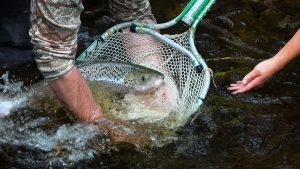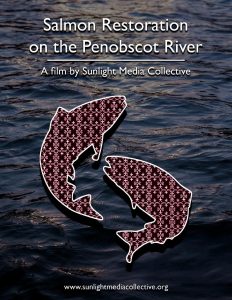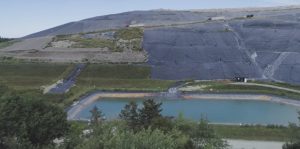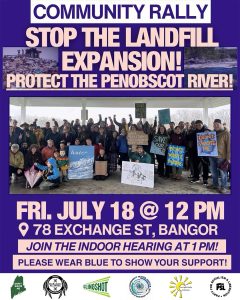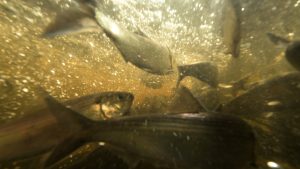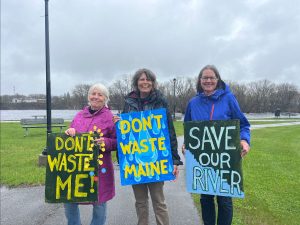“..For both Wabanaki people and non Wabanaki people…It has a great amount of history. It’s ecologically sensitive and important to the ecosystem of our coast…”
– Darren Ranco, PhD, Penobscot Citizen, Professor at the University of Maine, MITSC Commissioner, Maine Climate Council committee member.

On Monday, the full Maine Legislature is expected to vote on LD 2266, “An Act Regarding Offshore Wind Terminals Located in Coastal Sand Dune Systems.” The bill, put forth by the Governor’s office five days before a public hearing, seeks to exempt a sand dune on Sears Island, in Searsport, from current state environmental protections to explicitly allow for the advancement of an offshore wind port and staging area on the island. Governor Mills announced last month that Sears Island is the state’s “preferred site ” for the major development, instead of the already industrialized Mack Point, also in Searsport.
Sears Island (known also by the Penobscot name Wahsumkik) is the largest undeveloped island within the state and one of the largest on the eastern seaboard, and considered important to bird migration. Construction of a wind port operation would require the destruction of 70 acres of forest and would impact a yet to be assessed area of marine eel grass. The destruction of a sand dune was reportedly missed in a first assessment of the site, thus prompting the Governor’s bill.

At the public hearing on LD 2266Passamaquoddy Representative to the Maine Legislature Aaron Dana, expressed opposition to the bill and deep concern for the unstudied impacts of off shore wind operations and the siting of a staging development and port on Wahsumkik/Sears Island.
“These projects are often driven by the profit motives that prioritize corporate interests over the well being of the Indigenous people of Maine and the surrounding communities of non-tribal members alike….The push for the offshore wind project energies, the offshore wind energy must be critically examined from a Native perspective, taking into account the profound impacts on our environment, our culture, and our communities.”
“The installation and the operation of the offshore wind turbines often encroach upon sacred sites and areas of cultural significance. This project, especially for the Penobscot Tribal territory, these places hold deep spiritual value for our community and are integral to our cultural identity. The industrialization of these areas not only desecrates our sacred sites, but they also erode our cultural heritage and the connection to the land and the sea.”

Penobscot Nation Chief Kirk Francis says, there has been a lack of information sharing or any meaningful consultation by the state of Maine regarding the proposed off shore wind port at Wahsumkik, and a lack of study and comprehensive review regarding cultural resources and environmental impacts.
“We just don’t understand what the impacts are. We don’t understand what the impacts are to sensitive cultural spaces on the island. We don’t understand what migratory routes might be affected for fish, if any.”
“It seems to make sense that this would be done in a place that doesn’t have to disrupt undeveloped territory, places that have already gone through reviews for what they have in place now.”
“We have concerns. Obviously, we have a history in that area. Our departments and others believe there are culturally sensitive issues that we should discuss and understand. And like I said, nobody’s gone over the project with us… …The State made a point to point out that they sent a letter back in January. That’s not consultation. We need to sit down and understand the details of things. And it can’t be, you just send a letter and check the box.”
“We’re opposed to the process. The lack of real meaningful consultation with the Tribes puts us in a position where we can’t be supportive of any project at this time. There needs to be a comprehensive review of impacts.”
“Offshore wind, this is a new technology. As you know, these turbines are massive. There’s a lot of infrastructure that goes on and a lot of sea traffic.”
“Offshore wind is a big issue all throughout New England. We just had sessions on it at USET (United Southern and Eastern Tribes). The Massachusetts Tribes, New York and others now all over the country, the Pacific Northwest, others are really starting to get concerned. I don’t think anybody disagrees that we need to move towards more of a non-fossil fuel energy. I think that we’re all not against wind, but it’s the process and how that development takes place and what are the impacts.”

Darren Ranco is a Penobscot Nation Citizen, Chair of Native American Programs and Professor of Anthropology at the University of Maine at Orono and a Penobscot Representative to the Maine Indian Tribal State Commission (MITSC). He is also on the Equity Subcommittee and the Natural and Working Lands Working Group on the Maine Climate Council.
He spoke to Sunlight Media Collective on his opposition to LD 2266, “An Act Regarding Offshore Wind Terminals Located in Coastal Sand Dune Systems.” Here is part of that discussion:
Darren Ranco:
“I don’t understand why there’s this kind of last minute urgency, this exempting environmental review. I think that even identifying Sears Island, as the governor did a few weeks ago, without a real direct set of discussions with the Tribes, I think that doesn’t reflect a healthy relationship in terms of communication. So that concerns me.”
“Sears Island is a really important cultural site. It’s an important site for a bunch of reasons for both Wabanaki people and non Wabanaki people. It has a great amount of history. It’s ecologically sensitive and important to the ecosystem of our coast. And there’s a reason why the large majority of that island is under a conservation easement. It is a delicate ecosystem. To put any development through without some sort of review of how this fragile ecosystem would be impacted… Just strikes me as really suspicious, to do it when the offshore wind development itself is years away in terms of even where this is going to be built. I think in general I would say I support it (off shore wind), but it has to be done in a smart and public way.”
“I’m deeply concerned with this approach and I think more consultation is needed, especially with the Tribes. But I think the people who care, who are stewarding Sears Island, who are non-native, are also deeply concerned that this feels very last minute out of the blue and unnecessary to rush it in this way.”
“I think we need to slow it down. I’d love to see a study comparing the ecological impacts of this location with Mack Point and what are the costs and benefit. With this short circuit, we will never know. That will never be done, and there’s no reason, in my opinion, to rush it in that way. So let’s do it in an above board way. It’s a really fragile ecosystem. It’s really important. Culturally, I would want this to be done with some real slow deliberation and study.”
Sunlight Media Collective:
“Monday, April 1st there is expected to be a vote by the full legislature on this legislation, that, as we’ve said, the governor introduced five days prior to its public hearing before the ENR, proposing a rollback of environmental regulations that protect a sand dune that is in the way of development on Sears Island. Can you comment further?”
Darren Ranco:
“This proposed legislation could harm a fragile ecosystem without environmental review.”
“I would really, really, again, I would urge anyone to not vote in favor of this. I don’t think there’s an urgency that seems legitimate to me and I’m really concerned about it. It feels very secret and rushed.”
“I mean, ironically, folks who’ve been resisting our sovereignty bills and our self-determination bills will raise the specter that these are legislation put forward in the last few days. Even though of course for years, the map and framework of the legislation has been part of the public record. Whereas some of the same people criticizing sovereignty bills for these sort of last minute pieces of legislation are now in support of this.”
“It’s the kind of political hypocrisy that makes us not trust in government, not trust our partners and our relations with one another.”
“I’m just deeply concerned, as someone supporting climate change adaptation work in the state with the Tribes and a host of other projects around Land Return and our ability to take care of the most fragile ecosystems in our state, I would definitely urge people to vote ‘No’ on this proposed legislation.”
Sunlight Media Collective:
“You have spoken to this, but can you speak particularly through the lens of what concern comes up for you in this setting a precedent for environmental rollbacks for industry when the state decides it’s expedient?”
Darren Ranco:
“I mean, it’s almost always a horrible precedent to exempt environmental review, especially in a project that is meant to help our environment. I mean, of course that can only be considered deeply ironic, but I think this idea that you can shame people by saying, “well, if you vote against it, you’re saying you’re protecting Sears Island, but you don’t really want to have offshore wind.” That’s a false choice.”
“I mean, again, from my understanding, it feels there’s no urgency needed like this. And part of being better stewards in protecting places, including a place like Sears Island, including as well as the whole world, is that there has to be a procedural relationship and a procedural justice to treat each other and the planet well. And so the idea of rushing things almost always produces the kind of results that have led us to the climate crisis.”
“You cannot disconnect climate work like developing offshore wind from a real, honest and open procedural framing of the costs of that work. And to me, costs are the ecological costs. So I think hiding that actually is against the ultimate goal of what the offshore wind is supposed to be doing. So some people call this greenwashing, some people call it the same old, same old in terms of environmental injustice. But I don’t see the reason or the rationale, especially for this kind of project and for this kind of ecosystem and with another option on board. I think for all those reasons, it doesn’t make a lot of sense.”
Sunlight Media Collective
“Just an add-on with the impacts on climate. It seems that in some of these development projects that the deforestation and carbon sequestration from a forests is not considered.”
Darren Ranco
“Right? I mean, in terms of the idea that climate projects have not had these harms to local environments or local peoples is one of the things that climate mitigation and climate adaptation…I mean I teach classes on this. That’s one of the challenges of this work that have in the early part of the 21st century, been not done adequately, not addressed the issues of the frameworks of decision-making, developing projects that would actually last and be bought in by people simply because there’s a kind of rush to develop, which alienates local people. It alienates them from a long-term commitment to climate mitigation and adaptation work.”
“I care about Maine, I care about the climate crisis. You only have to live through this winter to realize just how different our winters are in Maine now. So I think it’s just really, it’s an unnecessary set of costs being created by a rush kind of situation. And I think it would hinder further work in this space by the state and its partners. And I would hope that some of those partners are the Tribes or Wabanaki Tribal Nations, because we think in seven generation frameworks and our climate adaptation work, we’re taking that very seriously.”

Information shared by Citizens To Protect Sears Island:
VOTE NO ON LD 2266
SEARS ISLAND is NOT the ONLY OPTION for OFFSHORE WIND.
1) There has been no environmental impact study for Sears Island, and available environmental assessments that support development of the Island. However multiple assessments are available that discourage port development of any kind on the Island.
2) Sears Island has been deemed to have significant ecological value, invaluable capacity for future carbon sequestration, as well as many rare species, which are all necessary for future climate resilience. [The Resilient Land Mapping Tool, The Nature Conservancy, TNC Screenshots 2010, TNC Screenshots 2050]
3) Mack Point is the fastest option to permit and construct a wind port in Penobscot Bay that meets the 100-acre size requirement. Environmental permits will be granted without delay as the site is industrialized with limited ecological value. If expansion is required over time, collaboration may occur with the old mill site in Bucksport for smaller components, economically uplifting the entire region.
4) The MDOT has not considered the most recent Sprague Energy site use proposal, but it is a further improvement of the Moffatt and Nichols Report of 2023.
5) Construction costs at Mack Point are equivalent, or less than Sears Island ($400 to $500 million). [Moffatt and Nichols Report 2023]. It is NOT TRUE that Sears Island will be cheaper to develop because the State owns the land. The State is not factoring in costs that will be associated with development or operation. For example, causeway expansion and mitigation for wetland loss.
6) Dredging needed at Mack Point is minimal compared to Sears Island, with less potential sediment contamination. [Moffatt and Nichols Report 2023], [2021 Maine DOT OSW port Infrastructure Feasibility Study – Concept Design Report 11-17-2021]
7) Developing Mack Point has strong support from the regional community.
Information Shared by Alliance for Sears Island:
https://allianceforsearsisland.org/
“The Alliance for Sears Island currently includes Friends of Sears Island, Friends of Maine Coastal Islands National Wildlife Refuge, Friends of the Harriett Hartley Conservation Area, Islesboro Islands Trust, Public Employees for Environmental Responsibility, Sierra Club Maine Chapter, Upstream Watch and a growing number of citizens, all eager to maintain the ecological integrity of Penobscot Bay even as we combat the climate emergency. “
“Visualize this: while undertaking renewable energy development to mitigate climate change, re-purpose Mack Point’s historical coal and oil-based working waterfront or destroy more than 100 acres of intact green and blue terrestrial and marine ecology at Sears Island. We think the choice is quite clear.”

